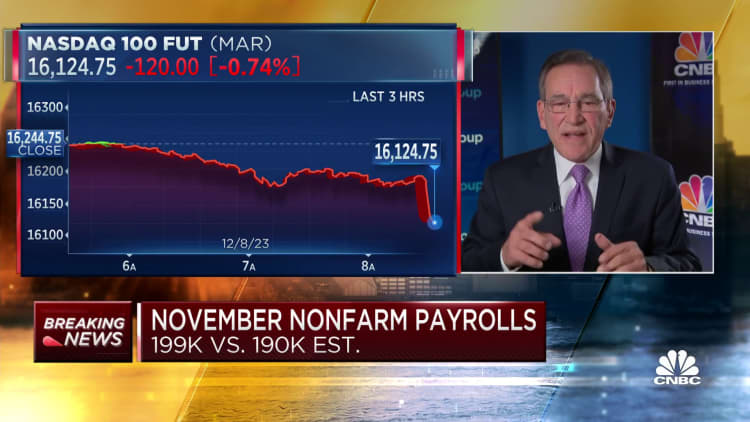
The U.S. job market once again surprised to the upside in November, as strong growth in health care and a few other sectors helped the economy add nearly 200,000 jobs and push the unemployment rate down.
Health care and social assistance added more than 93,000 jobs for the month, making it the top category for job growth, according to the U.S. Bureau of Labor Statistics. Government jobs grew by 49,000, while leisure and hospitality added 40,000 jobs.
The job gains for health care and social assistance rise to 99,000 when including private education, as some economists do.
Much of the labor market story over the past two years has been tied to the economic rebound from the Covid-19 pandemic, but the health-care growth appears to be part of a longer-term trend.
“We’re back to 2019 in some ways. If prior to the pandemic, you would have said, ‘Hey, health care’s going to be one of the largest sources of hiring in late 2023,’ no one would have been surprised by that, I think. There are very long-term structural tailwinds here,” Nick Bunker, director of economic research at Indeed Hiring Lab, told CNBC.
Bunker also pointed out that health care is less sensitive to higher interest rates or other cyclical factors that affect the U.S. labor market.
Another key part of the jobs growth story in November was returning strike workers.
Manufacturing employment rose by 28,000, helped by the 30,000 jobs gained in motor vehicles and parts as the United Auto Workers strike ended. The information sector was also bolstered by the addition of 17,000 jobs from the motion picture and sound recording industries, as Hollywood production restarts after the actors’ strike was resolved.
Retail trade was an outlier area to the downside, losing more than 38,000 jobs. The sector is roughly flat year over year in terms of total jobs, according to the Labor Department.
“I’m not spooked by it right now. … If you look at the nonseasonally adjusted gains for that sector, it’s roughly in line with what we saw last year. So maybe the seasonal adjustments need to catch up or change. I think we’ve seen this with a variety of data,” Bunker said.
Don’t miss these stories from CNBC PRO:

